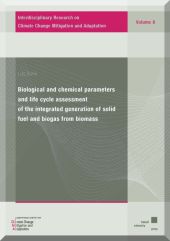 Neuerscheinungen 2014Stand: 2020-02-01 |
Schnellsuche
ISBN/Stichwort/Autor
|
Herderstraße 10
10625 Berlin
Tel.: 030 315 714 16
Fax 030 315 714 14
info@buchspektrum.de |

Lutz Bühle
Biological and chemical parameters and life cycle assessment of the integrated generation of solid fuel and biogas from
2014. 166 S. 210 cm
Verlag/Jahr: KASSEL UNIVERSITY PRESS 2014
ISBN: 3-86219-672-0 (3862196720)
Neue ISBN: 978-3-86219-672-2 (9783862196722)
Preis und Lieferzeit: Bitte klicken
Today s bioenergy systems are frequently characterised by limited conversion efficiency and dependencies on few species of energy crops leading to low biodiversity
in plant production. With the aim to improve the ecological performance of biomass production and processing and to convert a wider spectrum of biomass resources, the integrated generation of solid fuel and biogas from biomass (IFBB) was developed. Its core element is the mechanical separation of the wet conserved biomass into a solid fuel for combustion and a liquid for anaerobic digestion with subsequent production of heat and electricity from the biogas. This study investigated biological and chemical parameters of the IFBB process. Furthermore, life cycle assessment was conducted to evaluate the overall energy efficiency as well as saving potentials of fossil primary energy and emissions of greenhouse gases of the IFBB process along the entire process chain.
Today´s bioenergy systems are frequently characterised by limited conversion efficiency and dependencies on few species of energy crops leading to low biodiversity
in plant production. With the aim to improve the ecological performance of biomass production and processing and to convert a wider spectrum of biomass resources, the integrated generation of solid fuel and biogas from biomass (IFBB) was developed. Its core element is the mechanical separation of the wet conserved biomass into a solid fuel for combustion and a liquid for anaerobic digestion with subsequent production of heat and electricity from the biogas. This study investigated biological and chemical parameters of the IFBB process. Furthermore, life cycle assessment was conducted to evaluate the overall energy efficiency as well as saving potentials of fossil primary energy and emissions of greenhouse gases of the IFBB process along the entire process chain.


